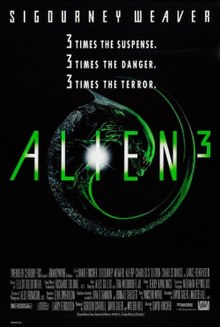| Alien 3 | |
|---|---|
 Theatrical release poster | |
| Directed by | David Fincher |
| Screenplay by | |
| Story by | Vincent Ward |
| Based on | |
| Produced by |
|
| Starring | |
| Cinematography | Alex Thomson |
| Edited by | Terry Rawlings |
| Music by | Elliot Goldenthal |
Production company | |
| Distributed by | 20th Century Fox |
Release date |
|
Running time | 114 minutes[1] |
| Country | United States |
| Language | English |
| Budget | $50–60 million[2][3][4] |
| Box office | $159.8 million[2][5] |
Alien 3 (stylized as ALIEN3) is a 1992 American science fiction horror film directed by David Fincher and written by David Giler, Walter Hill, and Larry Ferguson, from a story by Vincent Ward. Starring Sigourney Weaver reprising her role as Ellen Ripley, it is the third installment of the Alien franchise.
Set immediately after the events of Aliens (1986), Ripley and an Alien organism are the only survivors of the Colonial Marine spaceship Sulaco following an escape pod's crash on a planet housing a penal colony populated by violent male inmates. Additional roles are played by Charles Dance, Brian Glover, Charles S. Dutton, Ralph Brown, Paul McGann, Danny Webb, Lance Henriksen, Holt McCallany, Pete Postlethwaite, and Danielle Edmond. The film had a troubled production, facing numerous problems including shooting without a script and the attachment of various screenwriters and directors. Fincher, in his feature directorial debut, was eventually brought in to direct after a proposed version with Ward as director was canceled during pre-production.
Alien 3 was released on May 22, 1992. While it underperformed at the American box office, it earned over $100 million outside North America. The film received mixed reviews and was regarded as inferior to previous installments. Fincher has since disowned the film, deeming it unfaithful to his original vision due to studio interference. It was nominated for an Academy Award for Best Visual Effects, seven Saturn Awards (Best Science Fiction Film, Best Actress for Weaver, Best Supporting Actor for Dutton, Best Direction for Fincher, and Best Writing for Giler, Hill, and Ferguson), a Hugo Award for Best Dramatic Presentation, and an MTV Movie Award for Best Action Sequence. A sequel, Alien Resurrection, followed in 1997. In 2003, an extended and revised version of the film known as the Assembly Cut was released without Fincher's involvement, which received a warmer reception.
- ^ "ALIEN 3". British Board of Film Classification. Retrieved December 15, 2014.
- ^ a b "Alien 3 (1992)". Box Office Mojo. Retrieved December 15, 2014.
- ^ "Alien 3 – Box Office Data, DVD and Blu-ray Sales, Movie News, Cast and Crew Information". The Numbers. Retrieved December 15, 2014.
- ^ Alien 3 at the AFI Catalog of Feature Films
- ^ Cite error: The named reference
Foxclaimwas invoked but never defined (see the help page).